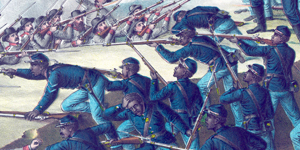 The Truth Staff
The Truth Staff
Juneteenth, now a national holiday, was first celebrated by formerly enslaved people in Texas when they were informed by Union soldiers on June 19, 1865, that they were now free. This was two and a half years after President Abraham Lincoln issued the Emancipation Proclamation. That June 1865 celebration became a national holiday when President Joe Biden officially signed the paper work in 2021, however, Juneteenth is not the first national holiday that formerly enslaved people founded.
Several weeks earlier, on the morning of May 1, 1865, in the city of Charleston, South Carolina which had been a hub of Confederate activity, an estimated 10 thousand people, most of them former enslaved African Americans began a special ceremony led by Black schoolchildren – an estimated three thousand of them, who marched around the Charleston Race Course, each carrying roses and singing “John Brown’s Body.” Three hundred Black women followed the children, members of the Patriotic Association, a group organized to distribute clothing and food to the newly freed.
Next came the African American men, the Mutual Aid Society, marching in cadence around the track and into the cemetery where hundreds of Union soldiers, many of whom had died in a Confederate prison, lay buried.
(The race track in question was the Washington Race Course and Jockey Club in Charleston, South Carolina. In the late stages of the Civil War, the Confederate army transformed the formerly posh country club into a makeshift prison for Union captives. More than 260 Union soldiers died from disease and exposure while being held in the race track’s open-air infield. Their bodies were hastily buried in a mass grave behind the grandstands.)
The Black children, women and men, carrying wreaths and singing, were followed by thousands of other White and Black citizens, singing songs such as the “Star Spangled Banner” and “We’ll Rally Round the Flag.”
A dedication ceremony followed conducted by ministers of the Black churches in Charleston and, after that dedication, the crowds gathered at the Charleston Race Course to hear dozens of speeches by Union soldiers, Black ministers and abolitionists. Picnics followed, along with a brigade of Union soldiers and Memorial Days had been founded by now-free Black citizens.
“The war was over, and Memorial Day had been founded by African Americans in a ritual of remembrance and consecration. But the struggle to own Memorial Day in particular, and the Civil War in general, had only just begun.” (Race and Reunion: The Civil War in American Memory. David W. Blight)
Memorial Day officially gained traction in 1868 and 1869 when General John A. Logan, commander-in-chief of the Grand Army of the Republic called on Union Army veterans to hold ceremonies and decorate the graves of their fallen comrades. Over time over entities and government bodies adopted the rituals – the New York legislature in 1873 designated May 30 as a holiday and by 1890 every other Northern state had followed suit.
